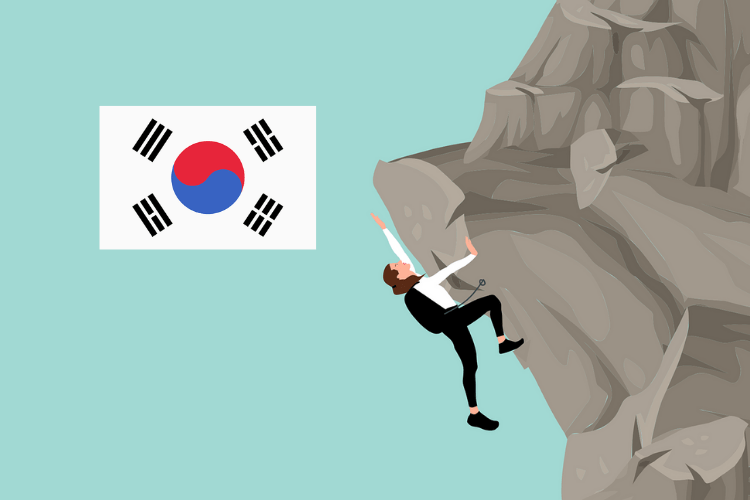So you’ve picked up Korean as your target language?
Turns out, it isn’t that hard to search for learning resources – the language is rich with content especially on the Internet.
There’s just one question bothering you: How hard is Korean?
Like with any new language, there’s gotta’ be some difficulties that lie up ahead, right?
Based on what I’ve experienced so far (and what others have encountered as well), here are 5 things that somehow make Korean a challenge, especially if English is your native language.
1. You Have to Learn a New Alphabet
Drop your ABCs, because you have to learn the alphabet system of Korean, called Hangul.
It’s not easy to start over with a new set of characters. But unlike Japanese or Chinese, Korean has fewer characters to remember overall.
Seriously, one character is a square (ㅁ), another character is a circle (ㅇ), plus two of them are just horizontal (ㅡ) and vertical (ㅣ) lines. That’s 4 out of the 40 vowels and consonants you have to learn. Just 36 to go!
All you have to do is get familiar with how these consonants and vowels are placed together to form new characters, using rules that with enough exposure you can master pretty easily.
Nonetheless, learning a new alphabet definitely feels like a challenge especially in the beginning.
2. Pronunciation Can Be Tricky
Because of familiarizing the Korean alphabet, you have to learn how the new set of characters and words sound.
Although some sounds can be picked up through their English equivalent, other vowels and consonants simply don’t have an English equivalent. You have to pronounce like it’s a new letter, such as the dreaded character ㄹ, which can sound as an r, l, or even d.
Sometimes, the struggle is in distinguishing the slight difference between characters, such as the difference between ㅜ (u) and ㅡ (eu), ㅗ (o) and ㅓ (eo), and between ㅈ (j) and ㅊ (ch).
As you can imagine, there’s a lot of pronunciation work you have to do.
3. Using the Right Particles is Important
Particles are markers you place at the end of a word to indicate the role of the word.
In fact, these particles play an important part in Korean grammar and forming meaningful sentences. It’s therefore important to choose the right particles or else you risk being misunderstood.
You attach 은 and 는 for example to make the word the subject of the sentence. 을 and 를 is added to emphasize that the word is the object of the sentence. Switching their places can be disastrous as it makes “The boy eats the bread” into “The bread eats the boy”.
You can jumble all the words and connectors (and all the complicated stuff) in a sentence. But you MUST attach the right particles to the right words, which takes time and practice to master.
4. You Have to Embrace the Subject-Object-Verb Structure
In basic English, sentence formation follows the Subject-Verb-Object format (SVO). In basic Korean, the structure turns into Subject-Object-Verb (SOV).
Applied to sentences, that means “Father buys a cabinet” becomes “Father cabinet buys”. In longer sentences, the main verb is almost always at the far end of the sentence.
This is a big adjustment you have to make if you’ve never learned SOV structure before (such as in Japanese). That’s why I’m often annoyed with English subtitles in Korean shows – my eyes are reading SVO format while my ears are hearing an SOV format and therefore don’t align well.
Frequently switching between these two structures is never easy at the start. But it’s not impossible to get along with, at least that’s what I’ve observed for myself.
5. Learning Conjugations Is Tough Work
If the reasons above are not yet enough, consider learning every single conjugation in Korean, including the use of honorifics, which if you mess up will make you sound disrespectful.
So not only should you adapt to the verb or adjective being at the end of the sentence, you have to choose the right ending to accurately convey your message and with proper respect.
I was told that using conjugates ending with 요 (yo) is a safe bet when conversing with anyone. But the many ways to produce meaning will only make sense to you by doing immersion and seeing how it’s used by native Koreans.
Dare to Take Up the Challenge?
Korean, being the language of over 70 million people, can be a rewarding language to learn.
Depending on your reason for learning this language, taking on the challenges can either be bearable or is not simply worth the struggle.
Personally, I love how I got my entrance into Korean easily thanks to the simple alphabet of Hangul. It helped me read Korean words and sentences in a fairly short time, which further sparked my interest on the language and culture.
You may be worthy of the Korean language, or you may be worthy of something else.
If you can take on the challenge, that is.
What do you think makes Korean a difficult language to learn? Did I miss some other challenge that could also be a source of struggle to Korean learners? I appreciate it if you can comment them down below.
